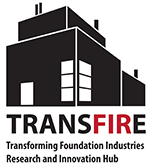“How can we make sure Awards are inclusive?” was a question posed this week in TransFIRe’s Equity, Diversity and Inclusion Working Group. I love our monthly meetings for questions like this, and the discussion that inevitably follows.
Our EDI Working Group is made up of EDI champions from within TransFIRe’s Industry Partner organisations and we have representatives from across the Foundation Industries, from businesses, universities, institutes and trade associations. We’ve come together with a common cause; to share and capture our collective experience, knowledge, learnings and challenges in an EDI Playbook to support each other and for other Foundation Industry organisations to follow.
In previous meetings we have invited speakers to spark discussion and exploration of a particular topic but this one we left in the hands of the group to bring ideas. One question posed by a group member particularly grabbed our attention. Their organisation was considering hosting an awards event to celebrate outstanding achievements. But, we wondered, how can this be done inclusively? Particularly, significant achievements may be linked to longer career spans, and therefore make awards less accessible for people earlier in their career journeys. How can it be done better?
Here are some of the insights, ideas and guidance that the group shared:
Things to avoid
Let’s start with what not to do. First, don’t make it about career stages. There is a danger of labelling people or putting them in buckets, and a risk of causing offense as a result. One group member shared a story of how a well-intended information event for employees over the age of 55 had faced backlash for just this reason.
Another danger zone is in the same small group always being the award recipients. When this happens the awards lose their meaning and people are left feeling excluded and demotivated.
But don’t convince yourself it’s too hard to get it right, and to do nothing as a result. This also isn’t the solution!
So what should we be doing?
Start with why
(Thank you Simon Sinek!) By starting with why the awards are being made, rather than focusing on categories of individual, we shift focus to what is delivered for the business to help us determine the scope and criteria for each award. Questions to ask: What has the achievement enabled? How do the nominees uphold and exemplify the company values?
Invite early feedback
Gather a diverse stakeholder group from across the business, and invite their feedback on the awards and criteria to shape the approach from early in the planning .
Ensure everyone has opportunity to apply
…and ensure they are equally encouraged to apply. Consider team as well as individual achievement. Leaders play an important role to inspire, role model, facilitate and encourage participation.
Be aware that how people like to be recognised is personal
Not everyone likes public recognition, and some people prefer to avoid taking the limelight in a ceremony. But that doesn’t mean that they don’t appreciate the recognition and they should still have the opportunity to win awards – and accept them in a way that considers their needs and preferences. People do appreciate time taken to speak with them about what has been achieved and to share thanks.
Trust in the process is key
Transparency in how people are nominated and selected for awards is essential to build trust. When people understand the process and selection criteria they are more likely to accept and celebrate the results, even if they are disappointed not to be selected this time.
The best recognition is day to day
While it’s great to have occasions that mark and celebrate big achievements, it’s perhaps even more important to build recognition into the day to day of work. Remember to thank people and show appreciation as the work is happening.
I hope this glimpse into our discussion about inclusive award events has been valuable to help you think about any similar events you have coming up. If you are interested to know more about our EDI Working Group, please visit the contact us page to get in touch!
Written by Jo Stansfield, Senior EDI Project Manager

